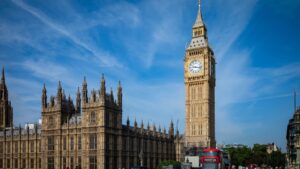Understanding the Current Economic Landscape: Britain’s Slow-Growth Trap and Rising Yields
As we navigate the complexities of the global economy from our platform at Extreme Investor Network, it’s essential to take a closer look at the ongoing economic challenges facing the U.K. The recent surge in government bond yields since the launch of the Labour government’s inaugural budget plan has raised alarms among investors and policymakers alike. In this blog, we’ll dissect the situation, examining the implications of rising yields, falling currency values, and potential strategies for economic recovery.
The Context: A Sharp Rise in Yields
Since the Labour government unveiled its first budget in October, yields on U.K. government bonds, or gilts, have climbed to levels not seen in decades. The 30-year gilt yields recently spiked to their highest rates since 1998, reflecting a significant shift in investor sentiment. Even short-term bonds, like the 2-year gilts, have registered yields above 4.5%, marking a notable departure from previous levels. This scenario isn’t isolated; borrowing costs are also on the rise in the eurozone and the U.S., indicating broader global trends affecting yield curves.
In the midst of this upheaval, the U.K. faces the prospect of public spending cuts or increased taxation, all while trying to maintain a vision of economic growth. The government’s pledge to reduce debt as a share of the economy within five years is now under intense scrutiny, with public sector net debt hovering at around 100% of GDP.
Investor Confidence Wanes Amidst Currency Declines
Another critical facet of the current landscape is the falling value of the British pound, which recently hit its lowest point against the dollar since November 2023. Such currency depreciation signals waning investor confidence and could exacerbate import costs, contributing further to inflationary pressures. This spiraling effect underscores the urgent need for effective fiscal policies that can stabilize and revitalize the economy.
A Global Perspective: External Factors at Play
It’s important to consider the external elements influencing the U.K. economy. The anticipated return of Donald Trump to the White House coupled with expectations for higher interest rates globally has added a layer of uncertainty. The interconnectedness of today’s economic environment means that decisions made abroad can have profound repercussions at home.
A Tightrope Walk: Balancing Budgets and Growth
The rise in gilt yields poses a significant challenge for the U.K. government. As mentioned by Michiel Tukker, Senior European Rates Strategist at ING, the rising yields create a "self-reinforcing feedback loop." Higher borrowing costs could hinder the government’s budgeting capabilities, making it even more difficult to adhere to fiscal rules regarding day-to-day spending.
Interestingly, recent analyses from the Office for Budget Responsibility indicated that sustained yield increases could eliminate the government’s projected £9.9 billion headroom for fiscal compliance. This predicament emphasizes the delicate balance the government must strike between austerity measures and stimulating growth.
Strategies for Economic Recovery
In light of these daunting challenges, what strategies should the U.K. government consider?
-
Diversifying Tax Structures:
Increasing reliance on National Insurance could alienate business interests and is arguably a short-sighted strategy. A more diversified tax framework addressing various income streams may offer a sustainable solution. -
Investment in Growth:
The recent budget proposed a staggering £5 billion investment in housing, which could foster job creation and stimulate broader economic activity. -
Addressing Inflation:
As inflation continues to erode consumer purchasing power, targeted fiscal measures aimed at alleviating cost pressures may bolster confidence and spending in the economy. - Engagement with Global Partners:
As external factors, such as those arising from geopolitical instability or international trade policies, heavily influence local economies, forming strategic alliances could provide stability and encourage investment.
Conclusion: A Path Forward for the U.K.
In conclusion, while we are witnessing a challenging phase in the U.K. economy characterized by slow growth and rising yields, it’s not a crisis akin to the 2022 mini-budget debacle. Former Finance Minister Vince Cable aptly noted that this scenario is not necessarily one of panic but rather a call for strategic thinking to navigate through a slow-growth environment.
At Extreme Investor Network, we believe that understanding these dynamics is crucial for both policymakers and investors. By staying informed about the evolving economic landscape, we can better anticipate shifts and make more strategic decisions that align with our financial goals. Your edge in this turbulent market can start with our insights—join us as we continue to explore these pressing issues in-depth.

